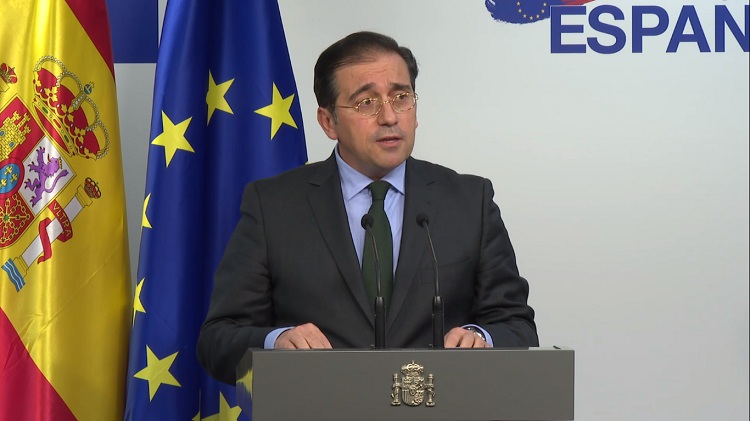Eduardo González
The EU Foreign Affairs Council yesterday approved the imposition of “massive” sanctions against Russia in case of aggression against Ukraine, a matter that “concerns European security in an indivisible way” and before which all Member States have shown “unity in diplomacy and unity in deterrence”, as reported yesterday by the Minister of Foreign Affairs, José Manuel Albares, who will appear before the Congress of Deputies today to explain the situation.
The joint declaration approved yesterday by the heads of diplomacy of the 27 warns that “European security is indivisible and that any challenge to the European security order affects the security of the EU and its member states”. Therefore, the Council “condemns Russia’s continued aggressive actions and threats against Ukraine” and warns that “any further military aggression by Russia against Ukraine will have massive consequences and severe costs.” Russia’s military escalation in the vicinity of Ukraine and its attempts to create dividing lines in Europe “undermine the foundations and principles on which European security rests and revive dark memories of fears that do not belong in the 21st century,” EU High Representative for Foreign Policy Josep Borrell told a press conference.
“Dialogue is the method we want to privilege, but knowing that we have to be prepared for any circumstance,” Albares declared at the press conference following the meeting. The EU foreign ministers, he explained, showed a “clear unity in dialogue, because we do not want any conflict in Europe, but as this obviously does not depend only on us and there is another party that has to want it too (Russia), there has been unity also in deterrence and, therefore, unity in terms of imposing sanctions of an enormous size and with an enormous cost, in the event of Russian aggression against Ukraine.”
“These are not blind sanctions, we all know about them and there has been full agreement,” the minister assured. Although he could not give details about these measures, he did specify that they will be “massive” and that they were preceded by “a reflection on the impact they could have on the European economy, including the Spanish one, and on how to alleviate it”. Besides, according to Albares, the heads of European diplomacy were informed by the Commission about an aid package to Kiev of 1.2 billion euros, “which is another way of showing the Union’s support to Ukraine”. In any case, said Albares, “the good news is that, in this tense moment in Europe, we are still at the moment of the four dis: diplomacy, détente, de-escalation and, also, deterrence”.
The meeting was attended via videoconference by U.S. Secretary of State Antony Blinken, who just yesterday held a conversation with Ukrainian Foreign Minister Dimitri Kuleba to reiterate Washington’s intention to provide a “swift, stern and unified” response, together with its allies, in the event of a Russian invasion.
“The very fact that he has intervened demonstrates the unity of the EU with its natural ally, which is the US,” Albares said, “There has been not only a European unity, but a transatlantic unity,” the minister continued. “It has become clear that this is an issue of European security, that the security of Europe and the security of allies is indivisible and that, therefore, decisions about our security cannot be taken without us, and the fact that Tony Blinken connected for more than an hour with all EU foreign ministers already shows that he understands this; he said so himself,” he added.
Spanish community and evacuations
Regarding the situation of the Spanish residents in Ukraine, Albares explained that “the Ministry, through the Embassy and the Consulate in Kiev, has been constantly monitoring the Spanish community, a little more than 500 people, to whom we promptly alert of any news regarding security”. “They are perfectly monitored,” he assured. “We follow the situation minute by minute through consular services, and in case of any evolution we would react quickly,” he continued.
However, he warned, “we are not considering at this time evacuating our colony, nor evacuating the Embassy.” “We have discussed it with European partners and no country is thinking of evacuating, the main countries are on the same line as Spain of not evacuating,” he added. The United States and the United Kingdom have announced the withdrawal of their diplomatic staff in Ukraine, but the 27 have not seconded this measure. “I don’t think we should dramatize as long as the negotiations continue and are continuing.” stated Borrell.
Appearance in Congress and nuances from Podemos
Albares will appear at eight o’clock this evening before the Foreign Affairs Committee of the Congress of Deputies, in an extraordinary session, to report on the situation in Ukraine, in particular, on the decisions of the EU Foreign Affairs Council. The appearance, explained the Minister in Brussels, has been called “at my own request and on the only day I can attend, to give explanations and exchange with all the political groups”.
Precisely, the main partner of the PSOE in the Government of Pedro Sanchez, Unidas Podemos, yesterday slightly receded from the strong criticism he poured last week against the policy of the Executive in the Ukrainian crisis. In a press conference, the party’s co-spokesman, Pablo Fernández, declared that the socialists have “rectified and changed the tone” because they have gone from the discourse of “mobilizing fighters and ships” to talk about “de-escalation and dialogue”, a position more typical of the “country of the no to war”. He also rejected that his party’s position is a “dissonant and discordant note” and admitted that Spain’s membership in NATO entails the obligation to respect the agreements reached within the Alliance. “The reality is what it is,” he added.







